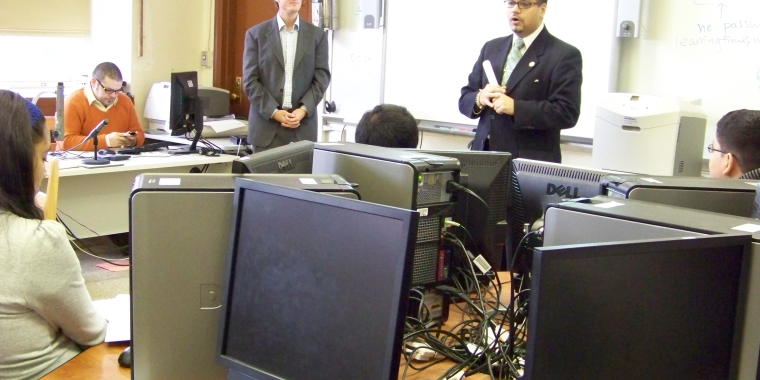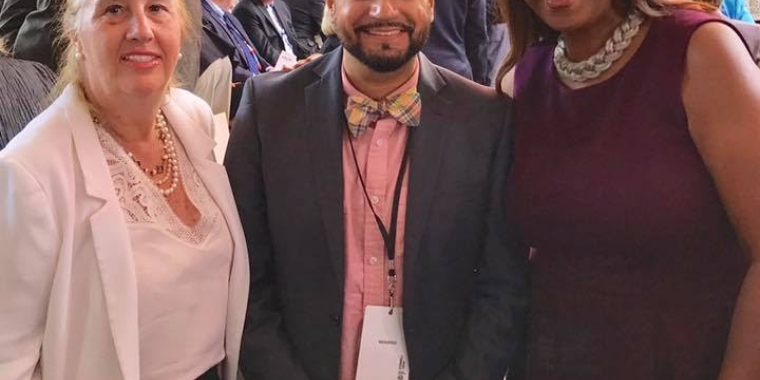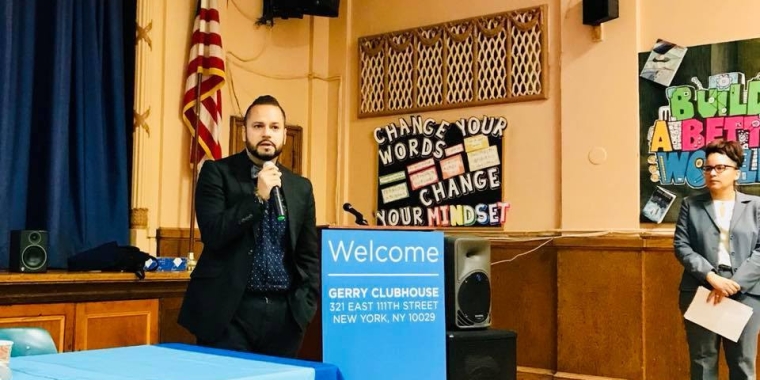
Senator José M. Serrano and NYS Senate Launch Revolutionary Open Legislation Website at Harlem High School

(New York, NY) - Today, Senator Jose M. Serrano launched the Senate's new Open Legislation website through an interactive presentation to students at the Manhattan Center for Science and Mathematics. The students participated in the first demonstration of the new, user friendly search engine which allows individuals to easily search, navigate, share and comment on all Senate legislation.
As part of its maiden demonstration, Serrano invited students to submit a comment online on a piece of legislation, becoming the first individuals throughout the state to use the Open Legislation search engine.
The site, which can be found at http://openlegislation.nysenate.gov, is part of the Senate's ongoing commitment to open, transparent and accessible government.
Utilizing a simple interface, individuals can now find legislative information as easily as performing a Google search. Previously, a bill number was required for a legislative search, effectively limiting such information to Albany insiders. Now, everyday New Yorkers can quickly perform a detailed legislative search in a number of different ways; by keyword, topic, Senator, committee, recent actions and recent votes.
For the first time, New York Senate legislative information will also be included in the index of major search engines and appear in relevant searches on sites like Yahoo, Google, or Bing. Instant Messenger (IM), Twitter, SMS and mobile (cell phone) web browsers will also be able to access the Open Legislation data at http://m.nysenate.gov, making key Senate information accessible to anyone with access to a computer, phone, or mobile device.
Also, in what may be a first for any legislature, New Yorkers may use the website to submit public comments on any bill, giving everyone a voice in the legislative process.
"Transparency in government has always been one of my greatest priorities as an elected official," said Senator Serrano. "This generation of students has an unprecedented amount of access to technology, and it is thrilling that they can now use those skills to keep themselves informed of the legislative process. As a lawmaker, it is an honor to take the future voters and policymakers of New York State step by step through a resource that will enrich their lives for years to come."
"The launch of the Open Legislation site will move the Senate a step closer to the more inclusive and transparent government New Yorkers deserve," said Senate Majority Conference Leader John L. Sampson. "It is my hope that students, civic activists and good government advocates across the state will take advantage of this new resource to engage in the legislative process and provide feedback going forward."
"The development of this technology provides a practical, every day solution so that real people can participate in the legislative process," said Senate President Malcolm A. Smith. "It makes critical information that affects the lives of every New Yorker as easy as possible to access for as many people as possible. This fulfills the promise made by the Senate to make our government accountable to the people of New York first and foremost."
The Open Legislation website is part of the broader Open Senate (http://open.nysenate.gov) initiative to bring greater transparency, efficiency, and public participation to the Senate. Since the Democrats took the majority, Senate payroll, expenditure reports, website statistics and more have all been made available to the public online, and work is underway to make a vast array of other Senate and legislative data publicly accessible for the first time.
The Open Legislation website is based entirely on open-source software; other entities, including other government bodies, may download and make use of the Open Legislation Software for their own purposes, at no cost. Any website developer may also use the data feeds available through Open Legislation to build their own websites incorporating Senate data.
"The launch of Open Legislation is a key milestone in our ongoing effort to make the New York State Senate the most transparent, efficient and participatory legislative body in the country," said Andrew Hoppin, Chief information Officer for the Senate. "We hope that the site will help more New Yorkers to not only keep tabs on what is going on in Albany, but to have a voice in what is going on."
ADDITIONAL QUOTES:
"The New York State Senate's new Open Legislation portal raises the bar for how government makes legislation available online," said Ellen Miller, co-founder and executive director of the Sunlight Foundation. "The site manages to serve programmers and citizens alike, offering intuitive search and navigation while still exposing a menu of structured data options. It's a pacesetter."
"Governments are using Internet technology to show the public how law is made and how legislatures really work," added Craig Newmark, founder of Craigslist.org and The Craigslist Foundation. "With this new system, New York State takes a leadership role in accountability and transparency."
"I look forward to being able to engage with a government as opaque as the NY State Legislature with a tool as promisingly transparent as Open Legislation," said Douglas Rushkoff, professor of Media Studies at the New School in Manhattan. "It's not that the data wasn't available before - it just wasn't accessible. This site may just help us see what's going on in a way that allows us to do something about it."
"NY's Open Legislation doesn't just put legislative information out into the public, but makes it a part of the living Web - easy to find, reuse, and talk about," said David Weinberger, Fellow at Harvard University's Berkman Center for Internet and Society. "Best of all, it feels like the Web!"
"This open legislation site changes the relationship citizens have with their government and demonstrates the New York State Senate's commitment to a transparent and accessible government," said Dave McClure, the U.S. General Services Administration's Associate Administrator of the Office of Citizen Services and Communications. "Now, more than ever before, state and local governments, the federal government, and other nations can use this innovative technology to reach out and engage more citizens in the legislative process."
###


